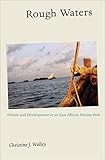Rough Waters : Nature and Development in an East African Marine Park / Christine J. Walley.
Material type: TextPublisher: Princeton, NJ : Princeton University Press, [2010]Copyright date: ©2004Edition: Course BookDescription: 1 online resource (336 p.) : 2 halftones. 2 line illusContent type:
TextPublisher: Princeton, NJ : Princeton University Press, [2010]Copyright date: ©2004Edition: Course BookDescription: 1 online resource (336 p.) : 2 halftones. 2 line illusContent type: - 9780691115603
- 9781400835751
- 333.720967823
- QH91.75.T5
- online - DeGruyter
- Issued also in print.
| Item type | Current library | Call number | URL | Status | Notes | Barcode | |
|---|---|---|---|---|---|---|---|
 eBook
eBook
|
Biblioteca "Angelicum" Pont. Univ. S.Tommaso d'Aquino Nuvola online | online - DeGruyter (Browse shelf(Opens below)) | Online access | Not for loan (Accesso limitato) | Accesso per gli utenti autorizzati / Access for authorized users | (dgr)9781400835751 |
Frontmatter -- Contents -- Illustrations -- Acknowledgments -- Glossary of Kiswahili Terms -- Preface -- INTRODUCTION. Conservation and Development in the Age of the "Global" -- PART ONE -- CHAPTER ONE. Battling for the Marine Park -- PART TWO -- CHAPTER TWO. "When People Were as Worthless as Insects": History, Popular Memory, and Tourism on Chole -- CHAPTER THREE. The Making and Unmaking of "Community" -- CHAPTER FOUR. Where There Is No Nature -- PART THREE -- CHAPTER FIVE. Establishing Experts: Conservation and Development from Colonialism to Independence -- CHAPTER SIX. Pushing Paper and Power: Bureaucracy and Knowledge within a National Marine Park -- CHAPTER SEVEN. Tourist Encounters: Alternative Readings of Nature and "Development" -- EPILOGUE. Participating in the Twenty-first Century -- Notes -- Bibliography -- Index
restricted access online access with authorization star
http://purl.org/coar/access_right/c_16ec
Rough Waters explores one of the most crucial problems of the contemporary era--struggles over access to, and use of, the environment. It combines insights from anthropology, history, and environmental studies, mounting an interdisciplinary challenge to contemporary accounts of "globalization." The book focuses on The Mafia Island Marine Park, a national park in Tanzania that became the center of political conflict during its creation in the mid-1990s. The park, reflecting a new generation of internationally sponsored projects, was designed to encourage environmental conservation as well as development. Rather than excluding residents, as had been common in East Africa's mainland wildlife parks, Mafia Island was intended to represent a new type of national park that would encourage the participation of area residents and incorporate their ideas. While the park had been described in the project's general management plan as "for the people and by the people," residents remained excluded from the most basic decisions made about the park. The book details the day-to-day tensions and alliances that arose among Mafia residents, Tanzanian government officials, and representatives of international organizations, as each group attempted to control and define the park. Walley's analysis argues that a technocentric approach to conservation and development can work to the detriment of both poorer people and the environment. It further suggests that the concept of the global may be inadequate for understanding this and other social dramas in the contemporary world.
Issued also in print.
Mode of access: Internet via World Wide Web.
In English.
Description based on online resource; title from PDF title page (publisher's Web site, viewed 30. Aug 2021)


